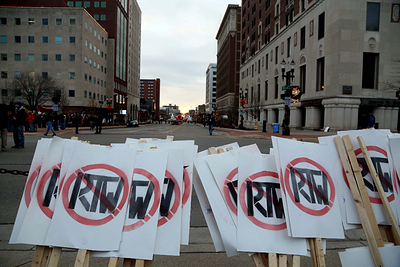
Anti-right-to-work protest signs wait for protesters to take them before the march to the state capitol in Lansing, Michigan, in December 2012.Eric Seals/MCT/ZUMAPRESS.com
A few weeks ago, the Michigan chapter of Americans for Prosperity, the Koch-backed conservative advocacy group, held a “citizen watchdog training” in a suburb of Detroit. The training was billed as a workshop for regular folks to learn “the best tools and techniques in investigative journalism, social media, and opposition research.” Featured speakers—including local activists, conservative state legislators, and Scott Hagerstrom, AFP-Michigan’s director—would also speak about efforts to “reform” Michigan’s schools.
Among the AFP set, reforming public schools usually means converting them into non-union, privately-run charter schools. Nationally, AFP is a vocal proponent of charters and “school choice.” And at the Michigan citizens training, one of the featured speakers, Norm Hughes, a member of the North Oakland Tea Party Patriots, offered this take on charters:
Kids aren’t going to charter schools if they’re “A” students. They go to charter schools because they’re failing students and, by and large, the charter schools have a higher percentage of poor families, ethnically challenged families…
Ethnically challenged? Hughes did not explain what he meant, but you won’t find that take on charters anywhere in the AFP literature. (Listen here to the audio of Hughes’ comment, grabbed by Progress Michigan, a liberal advocacy group.)
Whatever Holmes’ view of charters, AFP’s agenda in Michigan is cause for concern for Michigan’s public schools and teachers unions. AFP played a central role in ramming through so-called right-to-work legislation for public- and private-sector workers in Michigan in December. Right-to-work legislation is central to AFP’s agenda, and its passage in Michigan, a cradle of organized labor, was a major victory for movement conservatives.
If the January 19 event is any indication, a big push for charters is next up for AFP and its allies in the Michigan legislature. But before they go whole-hog on charters, AFP conservatives might want to give their conservative bedfellows, like Norm Hughes, a few tips about messaging.











